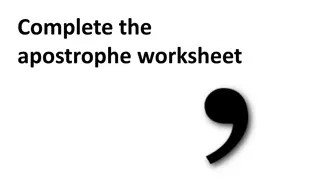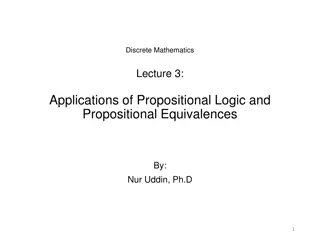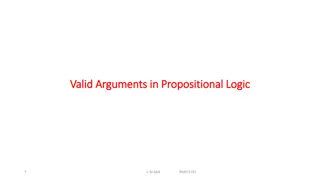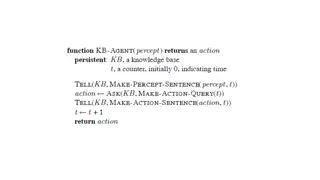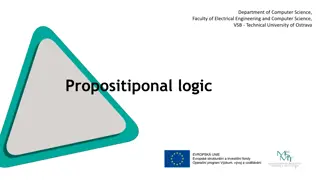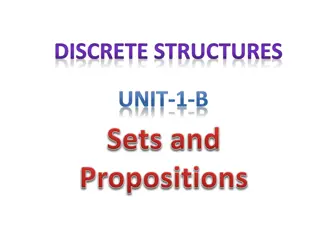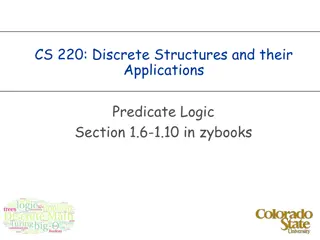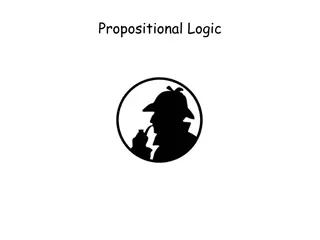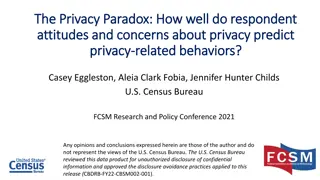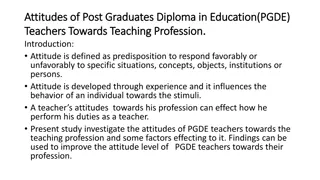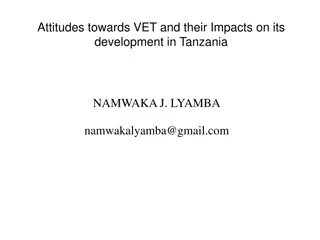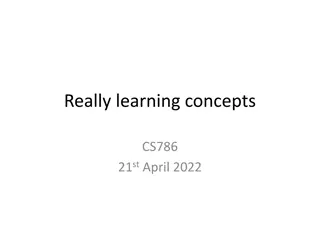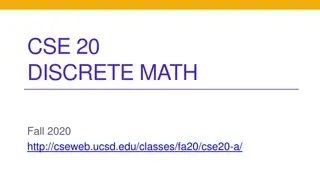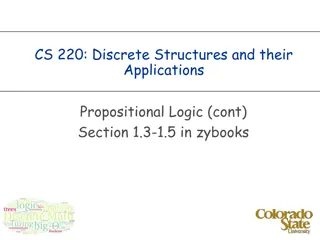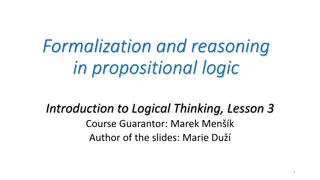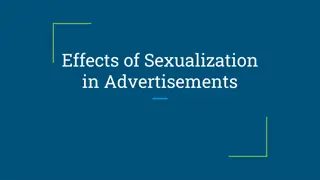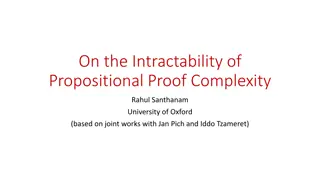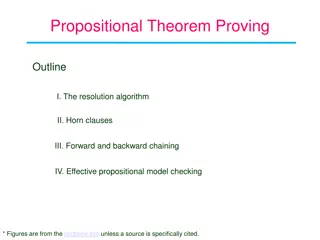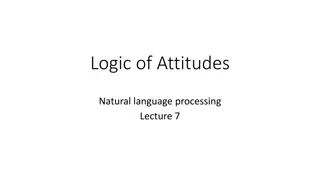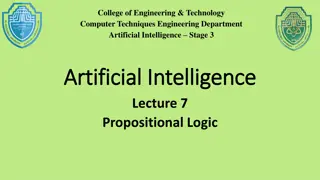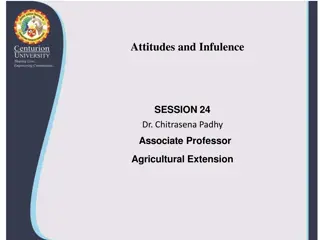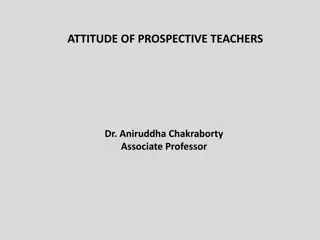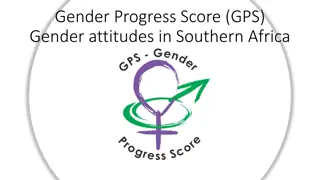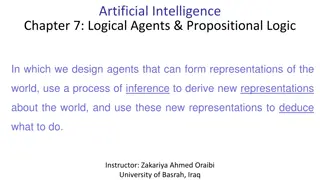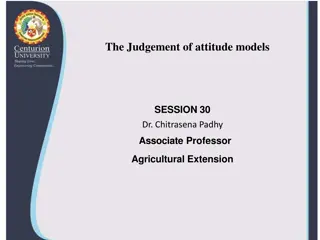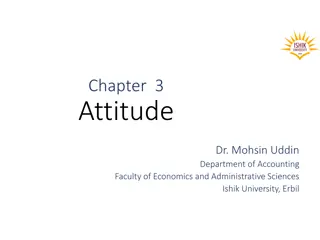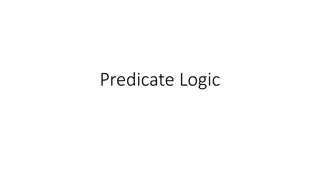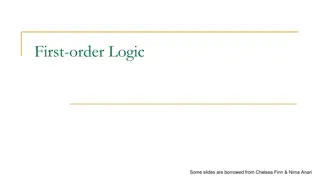Empowering Students with Positive Attitudes
Discover the importance of positive attitudes among students and how teachers can promote optimism and constructive thinking. Learn how a positive mindset leads to happiness and success in life. Explore the ways positive attitude manifests and its benefits. Start each day with love and develop a con
0 views • 25 slides
Promoting Positive Attitudes Among Students: Role of Teachers
Attitude plays a crucial role in how students perceive the world. Teachers have the responsibility to foster positive attitudes among students, helping them cope with daily challenges, stay optimistic, and strive for success. Cultivating a positive attitude leads to a brighter, happier, and more suc
0 views • 25 slides
Discrete Mathematics
Explore the foundations of logic and proofs in discrete mathematics, focusing on compound propositions, bit operations, and applications of propositional logic. Learn about how computers use bits for information representation and manipulation, and delve into translating English sentences into logic
5 views • 15 slides
Understanding Attitudes and Job Satisfaction
Attitudes play a crucial role in shaping our feelings towards objects, people, or events, influencing our behavior and job satisfaction. Components of attitudes include behavioral, cognitive, and affective aspects. Cognitive dissonance arises from conflicting attitudes or behavior. Major job attitud
1 views • 17 slides
Attitudes Toward Sports Among Colonial Settlers in the New World
The attitudes of European colonial settlers towards sports in New England, the Middle Colonies, and the South were deeply influenced by their religious backgrounds. While Puritans in New England were generally against play, Quakers and Dutch Calvinists in the Middle Colonies were more accepting. In
0 views • 19 slides
Understanding Attitudes and Job Satisfaction in the Workplace
Attitudes play a crucial role in job satisfaction, with cognitive, affective, and behavioral components shaping how employees feel about their work. Major job-related attitudes like job involvement, organizational commitment, and job satisfaction influence employee behavior and performance in the wo
0 views • 49 slides
Analyzing Attitudes towards Childcare in Source A and B
Explore and compare the different attitudes and methods used by two writers in conveying their perspectives on childcare, supported by relevant quotations. Question 4 prompts an in-depth analysis of language, tone, structure, and sentence types employed to convey attitudes. It builds upon the skills
0 views • 12 slides
Applications and Equivalences in Propositional Logic
This lecture explores applications of propositional logic, including translating sentences, system specifications, logic puzzles, and logic circuits. It also defines tautology, contradiction, and contingency as types of compound propositions, along with logical equivalences. Examples and illustratio
0 views • 16 slides
Understanding Valid Arguments in Propositional Logic
An argument in propositional logic consists of premises leading to a conclusion. Valid arguments are those where the truth of the premises implies the truth of the conclusion. To determine validity, you can construct a truth table to check if the conclusion always holds when all premises are true. T
0 views • 9 slides
Understanding Forward Chaining in Propositional Logic
Forward chaining in propositional logic is a recursive, stack-based version of back-chaining that can be modified to handle variables using unification and negation context. By applying a set of rules and facts, the process aims to prove a given query by iteratively inferring new information. Illust
0 views • 11 slides
Understanding Propositional Logic and Logical Operators
Learn about propositional logic, statements, logic operators, compound statements, exclusive-or, logical equivalence, and writing logical formulas for truth tables. Explore how to create compound statements for exclusive-or using different approaches and ensure logical equivalence. Enhance your know
0 views • 26 slides
Understanding Normal Forms in Propositional Logic
Explore the concept of normal forms in propositional logic, where each formula has a unique truth-value function. Learn about equivalence of formulas, determining normal forms, and canonic forms like Disjunctive Normal Form (DNF) and Conjunctive Normal Form (CNF). Discover how to find canonic forms
1 views • 22 slides
Understanding Propositional Logic at Kwame Nkrumah University
Dive into the world of symbolic logic and compound statements with a focus on Propositional Logic at Kwame Nkrumah University in Ghana. Explore the concepts of connectives, simple and compound statements, truth values, and more. Enhance your logical reasoning skills through a tutorial on symbolic lo
0 views • 57 slides
Understanding Propositional Logic and Mathematical Logic in Computer Science
Study the development of formal logic in computer science, focusing on propositional logic and mathematical logic. Learn about propositions, logical operators, and ways of combining statements to derive conclusions. Explore examples and understand how to determine the validity of arguments using log
0 views • 38 slides
Understanding Predicate Logic: From Propositional to Predicate Logic
Transitioning from propositional to predicate logic allows reasoning about statements with variables without assigning specific values to them. Predicates are logical statements dependent on variables, with truth values based on those variables. Explore domains, truth values, and practical applicati
0 views • 34 slides
Understanding Propositional Logic Concepts
Explore different facets of propositional logic, including conditional statements, logic operators, logical equivalence, contrapositives, and proofs. Delve into the intricacies of if-then statements, logical negations, and the nuances of if, only-if conditions. Enhance your understanding of proposit
0 views • 25 slides
Understanding the Privacy Paradox: Attitudes vs. Behaviors
Social scientists have identified a Privacy Paradox where individuals with strong privacy concerns may not always engage in behaviors that protect their privacy. While some studies show a discrepancy between attitudes and behaviors, others suggest that privacy-concerned individuals do employ privacy
0 views • 14 slides
Attitudes of PGDE Teachers Towards the Teaching Profession: A Study
Attitude plays a crucial role in a teacher's performance. This study investigates the attitudes of Post Graduates Diploma in Education (PGDE) teachers towards the teaching profession. Findings show that while attitudes related to academic responsibility, social recognition, and professional satisfac
0 views • 8 slides
Attitudes Towards VET and Its Impacts on Development in Tanzania
Attitudes towards vocational education and training (VET) in Tanzania and their impacts on its development are explored in this paper. Starting with the historical context of VET in Tanzania, the study discusses the evolution and current status of VET, highlighting challenges and attitudes towards i
0 views • 43 slides
Understanding Conceptualization in Machine Learning
Discussion on two types of representations (Propositional, Non-propositional) and the role of similarity in categorizing stimuli. Exploring supervised and unsupervised categorization methods, along with the capabilities of conceptualization beyond classification and clustering. Comparison of human a
0 views • 21 slides
Discrete Mathematics Learning Goals and Examples in Propositional Logic
Explore the learning goals in discrete mathematics focusing on translating English sentences to propositional logic, evaluating compound propositions, forming converses and contrapositives, and determining consistency. Dive into examples of conditional statements, converse, inverse, contrapositive,
0 views • 14 slides
Understanding Propositional Logic Fundamentals
Exploring the key concepts in propositional logic including conditional statements, converse, contrapositive, inverse, biconditionals, logical equivalence, operator precedence, and truth tables. Learn about the importance of truth values and logical equivalences in compound propositions.
0 views • 22 slides
Introduction to Propositional Logic: Formalization and Reasoning
Understanding formalization in propositional logic involves replacing atomic propositions with propositional variables and natural language connectives with logical connectives. The process abstracts from internal proposition structure, reducing meaning to True or False. The language allows formaliz
0 views • 18 slides
Effect of Sexualization in Advertisements on Viewer Memory and Brand Attitudes
This research project aims to investigate how sexualization of female models in advertisements impacts memory recall and viewer attitudes towards the brand. The study defines sexualization based on the attire of the model in the ad and will measure memory recall and viewer attitudes using specific c
0 views • 29 slides
Promoting Hand Washing for Better Health: Knowledge, Attitudes, and Practices
Understanding the importance of hand washing is crucial for preventing the spread of germs and diseases. This content emphasizes the knowledge, attitudes, and practices related to hand washing, highlighting key factors such as when, where, and how to wash hands effectively. It delves into common att
0 views • 6 slides
Understanding Propositional Proof Complexity and Lower Bounds
Studies focus on the intractability of propositional proof complexity, exploring the power of proof systems to verify tautologies. Discussion on known lower bounds and challenges in proving hardness of certain tautologies.
0 views • 23 slides
Propositional Theorem Proving Methods Overview
The overview covers essential techniques in propositional theorem proving including the resolution algorithm, Horn clauses, forward and backward chaining, and effective propositional model checking. It discusses methods such as resolution closure, completeness of resolution, and the significance of
0 views • 19 slides
Understanding Propositional and Notional Attitudes in Logic and Natural Language Processing
Explore the intricate concepts of propositional and notional attitudes in the context of logic and natural language processing. Dive into the distinctions between belief, knowledge, seeking, finding, solving, wishing, and wanting within the realms of individual intensions and hyper-intensions. Under
0 views • 16 slides
Analysis of Word Choices and Attitudes in Literary Texts
The provided content delves into the representation of characters through word choice and attitudes in various literary texts. It examines the implications behind phrases like "dark, competent hands" and "Mandy got her degree, did she? Dog my cats", shedding light on underlying biases and perspectiv
0 views • 16 slides
Understanding Propositional Logic in Artificial Intelligence
Covering the syntax, semantics, and logical inference in propositional logic for Artificial Intelligence. Learn about atomic sentences, logical connectives, operator precedence, and how to determine the truth value of sentences in a particular model. Dive into the rules and computations involved in
0 views • 28 slides
Understanding Attitudes and Influence in Behavior Formation
Attitudes are influenced by various factors such as experience, social roles, conditioning, and observation. They can be learned through classical and operant conditioning and by observing others. However, attitudes do not always align with behavior. Factors influencing attitude strength include exp
0 views • 16 slides
The Impact of Attitudes on Teaching Profession in Contemporary Education
The changing nature of the teaching profession in the contemporary era has led to shifts in teachers' attitudes towards their work. Attitude is viewed as a state of preparation for action, affecting behavior and social interactions. Various scholars have defined and studied attitudes as internal sta
0 views • 20 slides
Understanding Gender Attitudes in Southern Africa
The Gender Progress Score (GPS) survey collected responses from 15 countries in Southern Africa between 2019 and 2021 to gauge gender attitudes. With a total of 34,323 responses, the survey revealed insights on gender attitudes, with women comprising 49.5% of respondents. The scores ranged across th
0 views • 18 slides
Understanding Logical Agents and Propositional Logic in AI
Designing logical agents involves forming representations of the world, using inference for deriving new insights, and deducing actions based on these representations. Knowledge Base (KB) is a crucial component, comprising known facts and current percepts to infer hidden states. Propositional logic,
0 views • 23 slides
Workplace Safety Awareness: Key Attitudes and Preventive Measures
Understanding the critical importance of safety in overhead line maintenance, this content highlights key attitudes towards safety, the causes of accidents and injuries, and ways to prevent them. Emphasizing the need for a safety-conscious mindset and proactive measures, it underscores the responsib
0 views • 14 slides
Understanding Contemporary Representational Models of Attitudes
Fazio's representational model posits that attitudes are stored as summary evaluations associated with objects, influencing accessibility and behavior. Existing attitudes impact the assimilation of new information, though specific processes remain unelaborated.
0 views • 8 slides
Understanding Attitudes: Components and Impact on Life
Attitudes play a significant role in our perception and behavior towards people, objects, and situations. This content covers the definition of attitudes, their formation, components (cognitive, affective, behavioral), and the impact of a positive attitude on one's life. By understanding attitudes,
1 views • 30 slides
Early Childhood Educator Attitudes to Giftedness Research Overview
Early Childhood Educator Attitudes to Giftedness and Early Entry research by Mimi Wellisch, PHD, explores the impact of gifted training on educator attitudes. It discusses the evolution of attitudes, training in giftedness, and regulation requirements for young gifted children in NSW. The research c
0 views • 33 slides
Understanding Predicate Logic and Quantifiers
Predicate logic extends propositional logic by allowing statements to be assigned specific values. The limitations of propositional logic are overcome through predicate logic, where statements like "?. is greater than 3" have subject and predicate parts denoted as ?(?). Furthermore, predicates can b
1 views • 20 slides
Understanding First-Order Logic Fundamentals
Explore the limitations of propositional logic and delve into the syntax, semantics, and inference rules of first-order logic. Learn about predicates, quantification, and how to express relationships among objects using predicates. Enhance your understanding of how first-order logic provides a more
0 views • 42 slides






